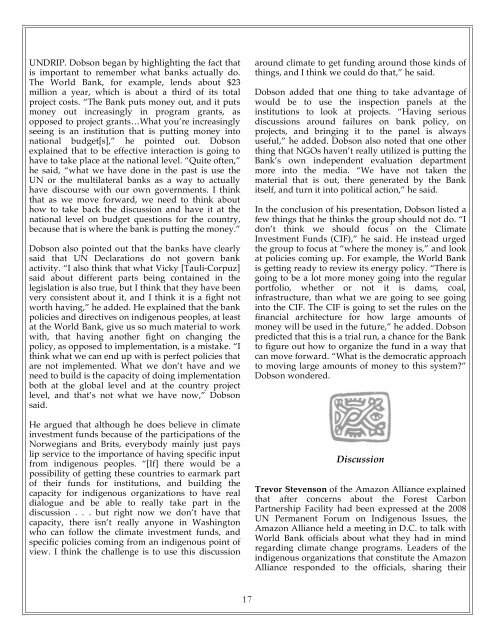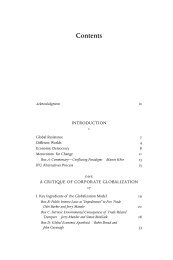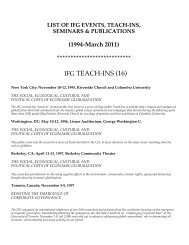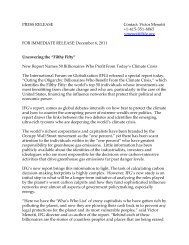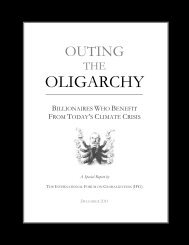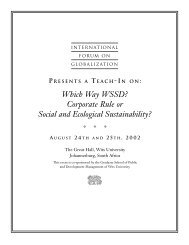UNDRIP Report - English FINAL - International Forum on Globalization
UNDRIP Report - English FINAL - International Forum on Globalization
UNDRIP Report - English FINAL - International Forum on Globalization
You also want an ePaper? Increase the reach of your titles
YUMPU automatically turns print PDFs into web optimized ePapers that Google loves.
<str<strong>on</strong>g>UNDRIP</str<strong>on</strong>g>. Dobs<strong>on</strong> began by highlighting the fact that<br />
is important to remember what banks actually do.<br />
The World Bank, for example, lends about $23<br />
milli<strong>on</strong> a year, which is about a third of its total<br />
project costs. “The Bank puts m<strong>on</strong>ey out, and it puts<br />
m<strong>on</strong>ey out increasingly in program grants, as<br />
opposed to project grants…What you’re increasingly<br />
seeing is an instituti<strong>on</strong> that is putting m<strong>on</strong>ey into<br />
nati<strong>on</strong>al budget[s],” he pointed out. Dobs<strong>on</strong><br />
explained that to be effective interacti<strong>on</strong> is going to<br />
have to take place at the nati<strong>on</strong>al level. “Quite often,”<br />
he said, “what we have d<strong>on</strong>e in the past is use the<br />
UN or the multilateral banks as a way to actually<br />
have discourse with our own governments. I think<br />
that as we move forward, we need to think about<br />
how to take back the discussi<strong>on</strong> and have it at the<br />
nati<strong>on</strong>al level <strong>on</strong> budget questi<strong>on</strong>s for the country,<br />
because that is where the bank is putting the m<strong>on</strong>ey.”<br />
Dobs<strong>on</strong> also pointed out that the banks have clearly<br />
said that UN Declarati<strong>on</strong>s do not govern bank<br />
activity. “I also think that what Vicky [Tauli-Corpuz]<br />
said about different parts being c<strong>on</strong>tained in the<br />
legislati<strong>on</strong> is also true, but I think that they have been<br />
very c<strong>on</strong>sistent about it, and I think it is a fight not<br />
worth having,” he added. He explained that the bank<br />
policies and directives <strong>on</strong> indigenous peoples, at least<br />
at the World Bank, give us so much material to work<br />
with, that having another fight <strong>on</strong> changing the<br />
policy, as opposed to implementati<strong>on</strong>, is a mistake. “I<br />
think what we can end up with is perfect policies that<br />
are not implemented. What we d<strong>on</strong>’t have and we<br />
need to build is the capacity of doing implementati<strong>on</strong><br />
both at the global level and at the country project<br />
level, and that’s not what we have now,” Dobs<strong>on</strong><br />
said.<br />
He argued that although he does believe in climate<br />
investment funds because of the participati<strong>on</strong>s of the<br />
Norwegians and Brits, everybody mainly just pays<br />
lip service to the importance of having specific input<br />
from indigenous peoples. “[If] there would be a<br />
possibility of getting these countries to earmark part<br />
of their funds for instituti<strong>on</strong>s, and building the<br />
capacity for indigenous organizati<strong>on</strong>s to have real<br />
dialogue and be able to really take part in the<br />
discussi<strong>on</strong> . . . but right now we d<strong>on</strong>’t have that<br />
capacity, there isn’t really any<strong>on</strong>e in Washingt<strong>on</strong><br />
who can follow the climate investment funds, and<br />
specific policies coming from an indigenous point of<br />
view. I think the challenge is to use this discussi<strong>on</strong><br />
around climate to get funding around those kinds of<br />
things, and I think we could do that,” he said.<br />
Dobs<strong>on</strong> added that <strong>on</strong>e thing to take advantage of<br />
would be to use the inspecti<strong>on</strong> panels at the<br />
instituti<strong>on</strong>s to look at projects. “Having serious<br />
discussi<strong>on</strong>s around failures <strong>on</strong> bank policy, <strong>on</strong><br />
projects, and bringing it to the panel is always<br />
useful,” he added. Dobs<strong>on</strong> also noted that <strong>on</strong>e other<br />
thing that NGOs haven’t really utilized is putting the<br />
Bank’s own independent evaluati<strong>on</strong> department<br />
more into the media. “We have not taken the<br />
material that is out, there generated by the Bank<br />
itself, and turn it into political acti<strong>on</strong>,” he said.<br />
In the c<strong>on</strong>clusi<strong>on</strong> of his presentati<strong>on</strong>, Dobs<strong>on</strong> listed a<br />
few things that he thinks the group should not do. “I<br />
d<strong>on</strong>’t think we should focus <strong>on</strong> the Climate<br />
Investment Funds (CIF),” he said. He instead urged<br />
the group to focus at “where the m<strong>on</strong>ey is,” and look<br />
at policies coming up. For example, the World Bank<br />
is getting ready to review its energy policy. “There is<br />
going to be a lot more m<strong>on</strong>ey going into the regular<br />
portfolio, whether or not it is dams, coal,<br />
infrastructure, than what we are going to see going<br />
into the CIF. The CIF is going to set the rules <strong>on</strong> the<br />
financial architecture for how large amounts of<br />
m<strong>on</strong>ey will be used in the future,” he added. Dobs<strong>on</strong><br />
predicted that this is a trial run, a chance for the Bank<br />
to figure out how to organize the fund in a way that<br />
can move forward. “What is the democratic approach<br />
to moving large amounts of m<strong>on</strong>ey to this system?”<br />
Dobs<strong>on</strong> w<strong>on</strong>dered.<br />
Discussi<strong>on</strong><br />
Trevor Stevens<strong>on</strong> of the Amaz<strong>on</strong> Alliance explained<br />
that after c<strong>on</strong>cerns about the Forest Carb<strong>on</strong><br />
Partnership Facility had been expressed at the 2008<br />
UN Permanent <str<strong>on</strong>g>Forum</str<strong>on</strong>g> <strong>on</strong> Indigenous Issues, the<br />
Amaz<strong>on</strong> Alliance held a meeting in D.C. to talk with<br />
World Bank officials about what they had in mind<br />
regarding climate change programs. Leaders of the<br />
indigenous organizati<strong>on</strong>s that c<strong>on</strong>stitute the Amaz<strong>on</strong><br />
Alliance resp<strong>on</strong>ded to the officials, sharing their<br />
17


